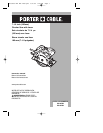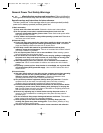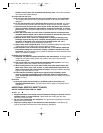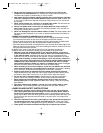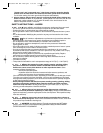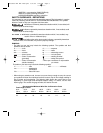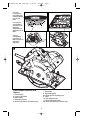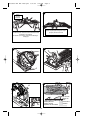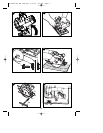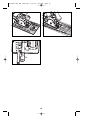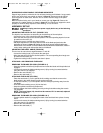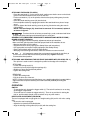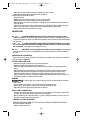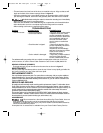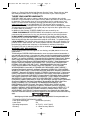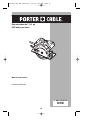
5
"plunge cuts" and "compound cuts." raise lower guard by retracting handle
and as soon as blade enters the material, the lower guard must be released.
For all other sawing, the lower guard should operate automatically.
d. Always observe that the lower guard is covering the blade before placing saw
down on bench or floor. An unprotected, coasting blade will cause the saw to walk
backwards, cutting whatever is in its path. Be aware of the time it takes for the
blade to stop after switch is released.
SAFETY INSTRUCTIONS - LASERS
Laser radiation, avoid direct eye exposure, serious eye injury can result.
• Do not use optical tools such as a telescope or transit to view the laser beam.
• Position the laser so unintentional eye contact will be avoided.
• Do not operate the laser around children or allow children to operate the laser / power
tool.
• Do not disassemble. Modifying the product in any way can increase the risk of laser
radiation.
Use of controls or adjustments or performance of procedures other than
those specified in this manual may result in hazardous laser radiation exposure.
• Do not adjust the laser, when the battery is inserted in the circular saw.
• Do not operate in explosive atmospheres, such as in the presence of flammable
liquids, gases, or dust.
• Store idle product out of reach of children and other untrained persons. Lasers / power
tools are dangerous in the hands of untrained users.
• Use only accessories that are recommended by the manufacturer for your model.
Accessories that may be suitable for one laser / power tool, may create a risk of injury
when used on another laser / power tool.
• Repairs and servicing MUST be performed by a qualified repair facility. Repairs
performed by unqualified personnel could result in serious injury.
• Do not remove or deface warning labels. Removing labels increases the risk of
exposure to radiation.
• For indoor use only.
• This product is intended for use in a temperature range of 41°F(5°C) - 104°F(40°C).
Some dust created by power sanding, sawing, grinding, drilling,
and other construction activities contains chemicals known to the state of
California to cause cancer, birth defects or other reproductive harm. Some
examples of these chemicals are:
• lead from lead-based paints,
• crystalline silica from bricks and cement and other masonry products, and
• arsenic and chromium from chemically-treated lumber.
Your risk from these exposures varies, depending on how often you do this type of work.
To reduce your exposure to these chemicals: work in a well ventilated area, and work
with approved safety equipment, such as those dust masks that are specially designed
to filter out microscopic particles.
• Avoid prolonged contact with dust from power sanding, sawing, grinding, drilling,
and other construction activities. Wear protective clothing and wash exposed
areas with soap and water. Allowing dust to get into your mouth, eyes, or lay on the
skin may promote absorption of harmful chemicals.
Use of this tool can generate and/or disperse dust, which may
cause serious and permanent respiratory or other injury. Always use NIOSH/OSHA
approved respiratory protection appropriate for the dust exposure. Direct particles away
from face and body.
Always wear proper personal hearing protection that conforms to
ANSI S12.6 (S3.19) during use. Under some conditions and duration of use, noise from
this product may contribute to hearing loss.
ALWAYS use safety glasses. Everyday eyeglasses are NOT safety
glasses. Also use face or dust mask if cutting operation is dusty. ALWAYS WEAR
CERTIFIED SAFETY EQUIPMENT:
:
:
:
:
:
:
90539190 REV MAY 2009.qxd 5/27/09 9:22 AM Page 5



